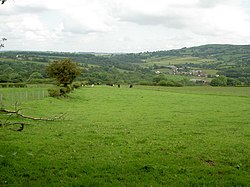Llanfynydd, Flintshire: Difference between revisions
Created page with "{{Infobox town | name=Llanfynydd | county=Flintshire | picture=Footpath to Llanfynydd - geograph.org.uk - 833497.jpg | picture caption=View towards Llanfynydd | os grid ref= ..." |
|||
| Line 26: | Line 26: | ||
The modern village of Llanfynydd developed in the 19th century, when there was quarrying and mining in the area. In common with most Welsh villages of the era, a Nonconformist chapel (Penuel, Welsh Congregationalist) was built. A railway, the Wrexham and Minera Joint Railway, was opened from [[Brymbo]] through Llanfynydd to [[Coed Talon]] near [[Mold]] in the 1870s. With the introduction of passenger services, a station was provided at Llanfynydd in 1898.<ref name=ds>[http://www.disused-stations.org.uk/l/llanfynwydd/index.shtml Llanfynydd Station], disused-stations.org.uk, accessed 26-05-10</ref> The station was eventually closed in 1950, and the line closed completely in 1952. | The modern village of Llanfynydd developed in the 19th century, when there was quarrying and mining in the area. In common with most Welsh villages of the era, a Nonconformist chapel (Penuel, Welsh Congregationalist) was built. A railway, the Wrexham and Minera Joint Railway, was opened from [[Brymbo]] through Llanfynydd to [[Coed Talon]] near [[Mold]] in the 1870s. With the introduction of passenger services, a station was provided at Llanfynydd in 1898.<ref name=ds>[http://www.disused-stations.org.uk/l/llanfynwydd/index.shtml Llanfynydd Station], disused-stations.org.uk, accessed 26-05-10</ref> The station was eventually closed in 1950, and the line closed completely in 1952. | ||
Llanfynydd's administrative history is actually fairly modern, as the civil parish was first created on 7 February 1845 out of the | Llanfynydd's administrative history is actually fairly modern, as the civil parish was first created on 7 February 1845 out of the townships of Uwch y Mynydd Uchaf and Uwch y Mynydd Isaf and part of the township of Cymmau; these townships forming part of the ancient parish of [[Hope, Flintshire|Hope]].<ref name=genuki>[http://www.genuki.org.uk/big/wal/FLN/Llanfynydd/ Llanfynydd], [[GENUKI]]</ref> The church, now dedicated to St Michael, was designed by John Lloyd and originally consecrated in 1843: it was badly damaged by fire in 1892. Many of the parish registers were destroyed in the fire.<ref name="genuki"/> | ||
==References== | ==References== | ||
{{reflist}} | {{reflist}} | ||
{{Commons category|Llanfynydd, Flintshire}} | {{Commons category|Llanfynydd, Flintshire}} | ||
Latest revision as of 10:26, 16 December 2022
| Llanfynydd | |
| Flintshire | |
|---|---|
 View towards Llanfynydd | |
| Location | |
| Grid reference: | SJ279567 |
| Location: | 53°6’9"N, 3°4’42"W |
| Data | |
| Population: | 1,752 (2001) |
| Post town: | Wrexham |
| Postcode: | LL11 |
| Dialling code: | 01978 |
| Local Government | |
| Council: | Flintshire |
| Parliamentary constituency: |
Alyn and Deeside |
Llanfynydd is a village and parish in Flintshire, some five miles north-west of Wrexham in Denbighshire. Its name is derived from the Welsh language words llan ("church" or "parish"), and mynydd ("mountain"). The village is situated in the valley of the River Cegidog beneath Hope Mountain.
The parish, which includes the villages of Llanfynydd, Cymau and Ffrith along with a number of smaller hamlets, had a population of 1,752 at the 2001 census.[1]
Llanfynydd village has a small primary school and a pub, the Cross Keys.
History
The area has been inhabited since early times. A cairn near Cymau, known in the past as Arffedogaid y Wrach but now destroyed, probably represented a prehistoric burial site.[2] Offa's Dyke runs through the valley, and evidence of earlier Roman settlement has been found at the nearby Ffrith site, suggesting a substantial civilian community with a connection to the XX Legion. The Roman presence was first noted by the antiquarian William Camden in the 16th century.[3]
The modern village of Llanfynydd developed in the 19th century, when there was quarrying and mining in the area. In common with most Welsh villages of the era, a Nonconformist chapel (Penuel, Welsh Congregationalist) was built. A railway, the Wrexham and Minera Joint Railway, was opened from Brymbo through Llanfynydd to Coed Talon near Mold in the 1870s. With the introduction of passenger services, a station was provided at Llanfynydd in 1898.[4] The station was eventually closed in 1950, and the line closed completely in 1952.
Llanfynydd's administrative history is actually fairly modern, as the civil parish was first created on 7 February 1845 out of the townships of Uwch y Mynydd Uchaf and Uwch y Mynydd Isaf and part of the township of Cymmau; these townships forming part of the ancient parish of Hope.[5] The church, now dedicated to St Michael, was designed by John Lloyd and originally consecrated in 1843: it was badly damaged by fire in 1892. Many of the parish registers were destroyed in the fire.[5]
References
- ↑ Llanfynydd Community, Office of National Statistics
- ↑ Grinsell, L. Folklore of prehistoric sites in Britain, David & Charles, 1976, p.245. The cairn was on a common called Cefn-y-Bedd - the "ridge of the grave".
- ↑ Ffrith, Clwyd-Powys Archaeological Trust]
- ↑ Llanfynydd Station, disused-stations.org.uk, accessed 26-05-10
- ↑ 5.0 5.1 Llanfynydd, GENUKI
| ("Wikimedia Commons" has material about Flintshire Llanfynydd, Flintshire) |
